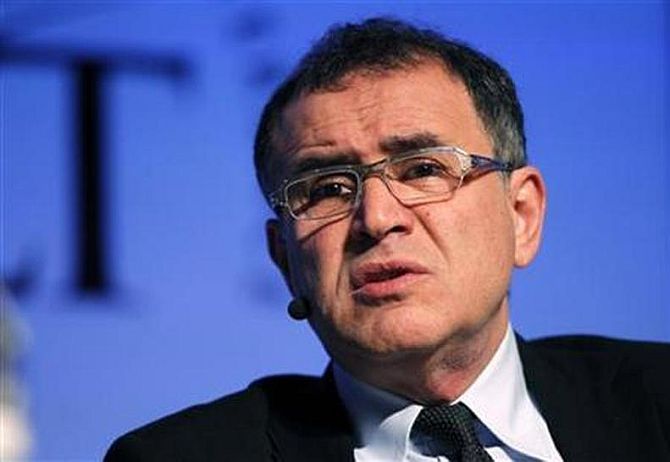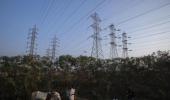You may be popular initially because of politics and ideology but if the economy slows down, you will be losing your popularity: Nouriel Roubini.

Indian policymakers have been "distracted" by ideological considerations, when the economic slowdown deserves the most attention, American economist Nouriel Roubini said on Thursday.
Foreign investors get "worried" by scenes of protests on the streets, the professor at New York University's Stern School of Business said, warning that economic slump can make a regime unpopular.
The comments from Roubini come at a time when official data showed that GDP growth may to slip to 11-year-low of 5 per cent this fiscal, and amid growing protests across the country against the Citizenship Amendment Act, which critics allege as being discriminatory against the Muslims.
"The macroeconomic policies are not where they should be, structural policies are not where they should be," Roubini said, while speaking at an event organised by CFA Institute in Mumbai.
In a conversation with global brokerage firm Morgan Stanley's Riddham Desai, Roubini rued that Indian policymakers are focusing on other aspects despite global headwinds like the impacts that can be caused due to a rise in oil prices amidst the US-Iran conflict.
"The attention of the policymakers should have been concentrated on the economy and is instead distracted by political things, ethnic things and other things to do with ideology," Roubini said.
Uncertainties are not good for the economy, he said and referred to President Bill Clinton's famous phrase 'It is the economy, stupid!' to warn that the policies adopted may not pay political dividends as well.
"You may be popular initially because of politics and ideology but if the economy slows down, you will be losing your popularity," Roubini said, adding that this applies to both authoritarian and democratic regimes.
Making it clear that economic weakness is bad regardless of one's views on the policies undertaken, he said foreign investors get "worried" by the sights of "problems on the streets”, in what was a reference to the anti-CAA protests across the country.
Roubini said the Indian economy is in a "slowdown" and the declining growth will "probably stabilise" in 2020.
In his speech, he bracketed India among the emerging markets where a growth pick-up is up to two quarters away.
The headwinds which the economy is facing include concerns on the budgeted fiscal deficit and also the impact of oil price hikes following the US-Iran tussle can have as the import bill will go up, pushing up the current account balances, he said.
While speaking on the monetary policy-related aspects, Roubini also flagged up the issue of RBI autonomy.
"There has been some concern on how much the RBI is independent, than what it used to be," he said.
On the oft-repeated strength of demographic dividend, he said it can deliver only if the country can deliver quality education, healthcare and employment to the youth.
India needs to create 1 million jobs on a monthly basis, failing which there can be instability, he warned.
On the positive side, he said India has strengths on the services and offshoring front, but will have to look at how it tackles innovation, he said.
Even though US and China have called a truce on trade front, a "cold war" is a possibility, where the countries will be forced to decide on which of the two superpowers they side with, he said.
India will have to decide on the economic relationship it has to purse with both the US and China, he said, adding that on one side will be democratic ideals and legacy, while on the other, the country has to deal with a strong neighbour.
China has invested and shown its prowess in all that will be important from a future perspective, including 5G technology and artificial intelligence, the economist said.
Just like the US-USSR cold war post the second world war, there will be a de-coupling of nations from one another leading to an eventual Balkanisation, he noted.
There is slim chance of the tensions between US and Iran blowing out into a full-fledged war, but there is a 50 per cent possibility of skirmishes like the one witnessed on Wednesday with missile strikes, continuing through the year, he said.
Such a possibility will take crude to $80 per barrel, which is very bad from India's viewpoint, he said.
Even though many forecasters, including the IMF, are expecting for a pick-up in global growth to 3.4 per cent, Roubini said he expects it to be stable at 3 per cent in 2020.
There are positive factors like the truce on US-China trade and a softer Brexit, but events like the US-Iran tensions will pull down growth, he said.
Photograph: Steve Marcus/Reuters











 © 2025
© 2025